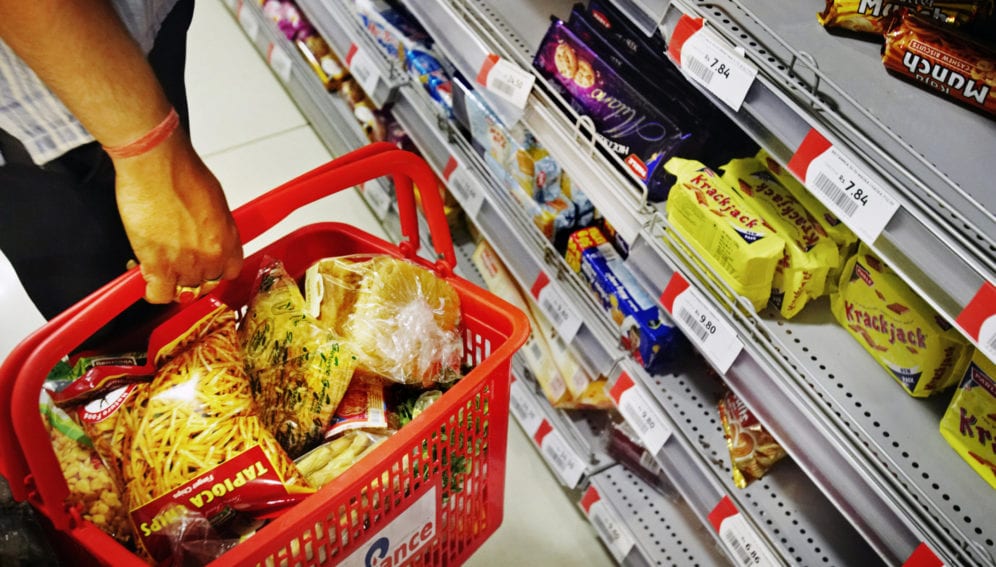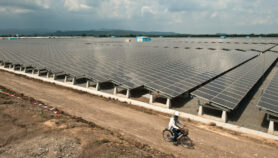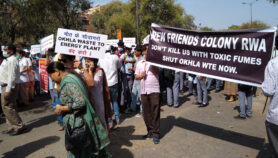Send to a friend
The details you provide on this page will not be used to send unsolicited email, and will not be sold to a 3rd party. See privacy policy.
The recent controversy in India over lead in instant noodle samples has been an eye opener for South Asia, says Nalaka Gunawardene.
As South Asians increasingly rely on processed foods, they need greater consumer awareness, better regulation and product innovation. Without this combination, the health of 1.5 billion people could be compromised by bad dietary habits.
Maggi noodles, which has been sold for over three decades, was banned in early June by India’s food safety regulator after tests found excessive levels of lead. [1] Some samples also showed excess monosodium glutamate, an artificial flavour enhancer.
The Food Safety and Standards Authority of India (FSSAI) said it took action against Maggi in the larger public interest of consumers and the duty cast by law "to ensure wholesomeness of food in India''.
Maggi producer Nestle insisted their product was safe, but started withdrawing it across India. The total recall — among the largest ever in the global food industry — is worth more than US$ 50 million. [2]
The instant noodle is also popular in India’s neighbouring countries where it has come under pressure. The Maldives and Nepal have banned Maggi imports and sales for now, while Bangladeshi and Sri Lankan authorities have ordered laboratory tests.
Learning from Maggi
The whole episode brings into focus the need for tighter food safety regulations as well as more responsible conduct by companies — both multinational and national — that produce and promote food products.
Eating is a personal and cultural activity where experts and regulators can go only so far. However, governments and corporations can do more to enable informed choices — by ensuring consumers have sufficient information through food labelling and are educated about health implications of diet. The reformulation of some food products can also minimise health risks at source.
According to S. Raghunath, a professor of corporate strategy and policy at the Indian Institute of Management, Bangalore, “The incomplete formulation and poorly-enforced regulatory system in the country has contributed to sporadic incidents of complacency in multinational safety standards and the oversight process. The weak grassroots supervision mechanism in India has partly contributed to the low transparency and public accountability of multinational corporation activities.” [3]
To draw lessons from the Maggi experience we must look at the bigger picture. Taking on global brands of hamburgers, instant noodles or colas can create catchy headlines and generate plenty of social media fodder, but the underlying issues are complex.
South Asians’ dietary habits are changing fast, with more people regularly eating processed foods that are rich in fats, sugar, salt, preservatives and chemicals. This can lead to increased obesity and cause non-communicable diseases such as diabetes, stroke and heart attacks.
In 2012, the Centre for Science and Environment (CSE), an independent research and advocacy organisation in India, did its own laboratory tests of popular brands of processed food (which they called junk food). They found french fries, pizzas, burgers, chips and instant noodles all had high contents of trans fats and salt. [4]
“Even worse is the fact that the companies — all of them being major global brands — are misleading the consumers by mislabelling their products. We found high amount of trans fats in products that claim to be trans fats-free. All this is happening because India’s labelling laws are weak and ineffective,” wrote Chandra Bhushan, CSE’s head of industry and environment programme.
CSE called for a ban on junk food from schools and places where children have easy access to these foods, and stricter implementation of advertising guidelines of such products. It also called for regulations to reduce salt, sugar and fats in junk food, and asked FSSAI to impose a “fat tax” on high-fat processed foods (as done in Hungary and Denmark), thus making them more expensive.
Parallel to this, CSE highlighted the need for mandatory labelling — at least for serving size, trans fats, saturated fats, sugar and salt — along with already mandatory nutritional information for all processed foods.
These recommendations apply equally well to other countries in South Asia which face similar challenges.
Rethinking modern diets
Some believe that more regulations and consumer awareness cannot stem this unhealthy trend.
Food policy expert Devinder Sharma argued in a recent op-ed for all kinds of processed foods to be checked for quality. “This has been long overdue and will go a long way in rebuilding consumer confidence,” he wrote. He asked if junk food sales can be banned, just as most countries have now banned cigarette smoking in public places. [5]
Such a drastic step would require wider debate. For now, public health professionals elsewhere in the world are advocating more restrictions. As long-term studies establish individual and societal costs of bad diets, our governments can no longer ignore this issue.
Scientists must collaborate with policy makers and consumers in the search for realistic solutions or alternatives. Encouragingly, the Indian Medical Association has decided to form a safe food consortium, involving various government departments and voluntary agencies. They hope to “make strong interventions in the area of food safety to create awareness among consumers, farmers and manufacturers of food products about what constitutes safe-to-eat food”. [6]
Across South Asia, countries need to enhance technical capacity for food testing and quality monitoring. Devinder Sharma notes how India, despite its well-established science and technology infrastructure, has only one food laboratory for every 88 million people. China, in contrast, has a food safety lab for every two million people.
Innovation needed
We can also learn from the experiences of Europe and North America where similar debates unfolded some years ago.
For example, as a group of UK scientists and policy experts once noted, expecting people to cook all food from scratch is unrealistic and not necessarily healthier. Instead, they urged people to check labels and avoid foods with high levels of salt and fat. [7]
South Asian societies are in transition with millions joining the middle class, rising aspirations and changing lifestyles. The faster pace of life cannot always accommodate freshly sourced food or traditional meals. Processed foods have entered this market niche.
Instant noodles take far less time than cooking a rice meal, and is considerably cheaper too. Likewise, powdered milk does not need refrigeration; nor does it spoil like fresh milk during frequent power outages. Advocates of healthy eating must factor in these realities.
While better regulating processed food governments should encourage local scientists and entrepreneurs to come up with food innovations that are healthy, convenient and affordable. Parallel to this, we need social marketing professionals to help make healthy eating ‘cool’.
Nalaka Gunawardene is a Colombo-based science writer, blogger and development communication consultant. The views in this column are his own.
This article has been produced by SciDev.Net's South Asia desk.
References
[1] Food authority justifies ban on Maggi in court. The Times of India. 28 June 2015.
[2] Nestle tries to win Indian hearts after Maggi noodle ban. Yahoo News. 23 June 2015.
[3] Why the Maggi Noodle Recall Has Landed Nestle in Hot Water. Knowledge@Wharton, 19 June 2015.
[4] Eat at your own risk. Down to Earth. 15 April 2012.
[5] It's junk, not food. By Devinder Sharma. dna 9 June 2015.
[6] IMA to form safe food consortium. The Hindu. 13 June 2015.
[7] 'Not all' fast food unhealthy. BBC Online. 1 February 2008.














